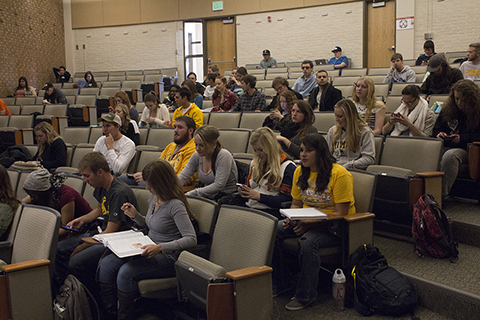
Common Core. These two words have spurned debate across Wyoming among school districts and political candidates alike.
However, the issue of common core is entirely different on the UW campus.
In the state of Wyoming the term common core typically refers to an education standard employed at the K-12 level. At the collegiate level common core refers to a general education program, known at UW as the University Studies Program (USP).
USPs are designed to provide a common core curriculum for undergraduate students that prepares them to meet certain standards set by each university in order to earn a four-year degree. They consist of standard math, science, English and public speaking courses; the basic classes that the university wants everyone to take.
“In my opinion you can decide what each institution thinks is most important by looking at what they decide to include in that common core curriculum,” Natawsha Mitchell, ASUW director of diversity and outreach, said. “So with the changing of the original 2003 USP that we are still in right now to this new 2015 USP you can look and see what people thought was important at one time and look at what they think is more important now and also how they believe that to be structured.”
The main purpose of a common core curriculum is unification throughout the university. It allows students from all colleges, whether it is the College of Business or Arts and Sciences, to have a similar background of basic courses.
“Basically I think the biggest difference across everything is there has been this real push for everything to be integrated,” Mitchell said. “They want every student to connect every class to every other one.”
The University of Wyoming has been using a USP since 1991 and it is redesigned roughly every ten years. The most recent overhaul, the 2015 USP, has been in progress for the last four years.
“It’s simpler and a little more focused, although there’s a lot of overlap with the previous program,” Alyson Hagy, interim associate vice president for undergraduate education and budgets, said.
The redesign will result in several noticeable changes to the common curriculum. Science and math requirements have both been adjusted, resulting in math going down a credit.
The communication and public speaking requirement from the 2003 USP will now be replaced with three communications courses along with a freshman seminar.
Mitchell said that these adjustments are promising. “I think that the new communication courses and the new first year seminar are really kind of interesting. I’m excited to see how it ends up turning out cause I think that it’s a lot of possibility for some really positive things to come out of both of those programs.”
The communications courses will deal with writing and public speaking. The second communications course will deal with communications relevant to a student’s major.
“We did some research and a lot of talking and we feel like public speaking related to content students are committed to and interested in, so particularly communications in their major, seems more relevant to students and produces more engaged students and better learning,” Hagy said.
The Diversity and Global requirements have been replaced in all colleges except A&S with the new human culture requirement. This requirement is designed with integration across the curriculum in mind and it too is disciplinary focused.
These changes will go into effect in the fall of 2015. Committees are currently sifting through different syllabi in an attempt to implement classes and develop courses that meet the new USP requirements.
The incoming class of 2014 will have the option at the end of the year to switch into the new USP or to stay with the 2003 version. Other students will be kept on the 2003 USP. Due to this it will take a few years before the new system fully takes effect.
“I would encourage students to continue talking to their professors, especially the ones that they know are working on these new syllabi,” Mitchell said. “Just because there is such an opportunity right now to really frame how we want that to be. Just be open and try to stay informed about what’s going on.”



